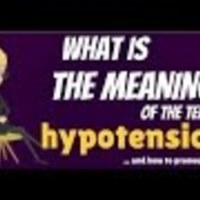Hypotension
Dublin Core
Title
Subject
Description
Hypotension is low blood pressure, especially in the arteries of the systemic circulation. Blood pressure is the force of blood pushing against the walls of the arteries as the heart pumps out blood. Hypotension is generally considered if systolic blood pressure less than 90 millimeters of mercury (mm Hg) or diastolic less than 60 mm Hg. However, in practice, blood pressure is considered too low only if noticeable symptoms are present.
Hypotension is the opposite of hypertension, which is high blood pressure. It is best understood as a physiological state, rather than a disease. It is often associated with shock, though not necessarily indicative of it.
For some people who exercise and are in top physical condition, low blood pressure is a sign of good health and fitness. For many people, excessively low blood pressure can cause dizziness and fainting or indicate serious heart, endocrine or neurological disorders. Severely low blood pressure can deprive the brain and other vital organs of oxygen and nutrients, leading to a life-threatening condition called shock.
Input by Sofia Nelly
Hypotension is the opposite of hypertension, which is high blood pressure. It is best understood as a physiological state, rather than a disease. It is often associated with shock, though not necessarily indicative of it.
For some people who exercise and are in top physical condition, low blood pressure is a sign of good health and fitness. For many people, excessively low blood pressure can cause dizziness and fainting or indicate serious heart, endocrine or neurological disorders. Severely low blood pressure can deprive the brain and other vital organs of oxygen and nutrients, leading to a life-threatening condition called shock.
Input by Sofia Nelly
Source
http://youtu.be/JQ7FlIkV18A
Publisher
Date
2016-08-15T14:13:38.000Z
Contributor
Sofia Nelly
Rights
Creative Commons License
This video represents licensed content on YouTube, meaning that the content has been claimed by a YouTube content partner.
This video represents licensed content on YouTube, meaning that the content has been claimed by a YouTube content partner.
Moving Image Item Type Metadata
Imported Thumbnail
https://i.ytimg.com/vi/JQ7FlIkV18A/default.jpg
Files
Collection
Citation
“Hypotension
,” Open Educational Resources (OER) , accessed February 17, 2026, https://oer.uinsyahada.ac.id/items/show/25.


